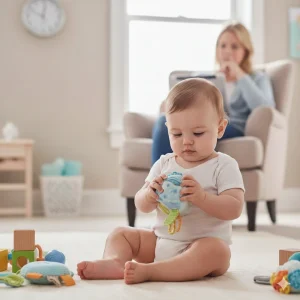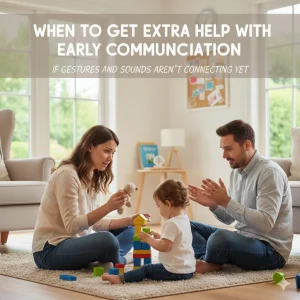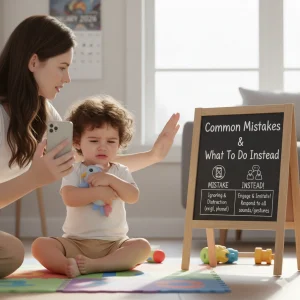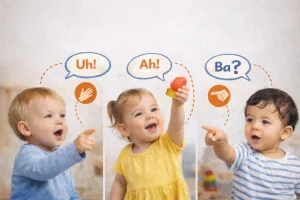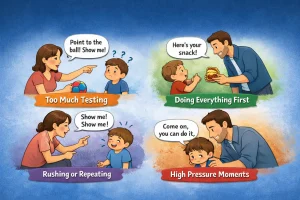Speech Delay Red Flags: What to Watch for Between 18–24 Months
By Wellness Hub
Last Updated: July 28, 2025
Is your toddler not talking as much as other kids their age? It’s natural to worry. Between 18 and 24 months, most toddlers go through a big leap in speech and language. But what if that leap doesn’t happen? In this article, we’ll walk you through the early signs of speech delay in toddlers, what’s typical for this age, and when it might be time to seek support. Knowing the red flags can help you take action early—because the sooner you support your child’s speech development, the better their progress can be.
Free Speech Help for Kids
Concerned about speech delays? Book a free consultation with our expert speech therapist and get guidance tailored to your child’s needs.
Why Speech Delay in Toddlers Happens Between 18–24 Months
If you’re wondering why your 18-month-old isn’t talking much or why your toddler seems slower to speak than others, you’re not alone. This stage — between 18 and 24 months — is a critical window for speech and language development. During this time, most toddlers are learning to name objects, ask for things, and express simple needs using words or gestures.
But what happens if those words aren’t coming?
Let’s break it down in a way that’s simple, clear, and helpful — because every parent deserves to feel confident about their child’s communication journey.
The Most Critical Window for Speech Milestones
Between 1.5 to 2 years of age, toddlers typically experience a language explosion — going from saying just a few words to using short phrases like “want juice” or “go park.” Here’s a quick snapshot of what most children are doing during this period:
| Age | Typical Speech Milestones |
|---|---|
| 18 Months | Says 6–10 clear words, understands simple instructions |
| 24 Months | Says 50+ words, uses 2-word combinations like “more milk” |
But remember, children grow at their own pace. A little variation is normal — but big gaps may signal something more.
Normal vs. Delayed Development
So, how do you know if your toddler is just a late talker or if there’s a potential speech delay?
Here’s a simple way to compare:
| Normal Development | Possible Delay |
|---|---|
| Imitates words and sounds | Doesn’t try to imitate sounds or words |
| Follows simple directions like “give me that” | Doesn’t seem to understand simple instructions |
| Combines words by age 2 | Still using only single words or none at all |
It’s not about comparing your child to others — it’s about understanding what’s typical and being aware of any red flags.
Early Signs of Speech Delay to Watch For
Here are some early warning signs of speech delay between 18–24 months:
- No babbling or very few sounds
- Not saying at least 6–10 words by 18 months
- Doesn’t follow simple directions like “sit down” or “come here”
- Not combining two words by 24 months (like “want toy”)
- Doesn’t point or use gestures to communicate
- Doesn’t imitate sounds or actions
- You’re relying on guesswork to understand their needs
If one or more of these feel familiar, it’s a good idea to explore next steps — and you don’t have to do it alone.
Key Speech Milestones for 18 to 24-Month-Olds
Know what’s typical before spotting what’s not.
When it comes to speech development, knowing what’s typical can help you recognize if your toddler is hitting the right milestones—or might need a little extra support. Many parents ask, “How many words should my toddler say?” or wonder if their 2-year-old is talking enough. This stage, between 18 and 24 months, is full of exciting changes in how your child communicates.
Let’s break it down.
What Most 18-Month-Olds Should Be Saying
By 18 months, toddlers are often:
- Saying 6 to 10 clear words on their own (like “mama,” “ball,” “up”)
- Using gestures like pointing, waving, and nodding
- Babbling in a way that sounds like conversation (“dadada bababa…”)
- Responding to simple questions or directions like “Where’s your shoe?”
- Showing excitement when they hear familiar words (like their name or favorite toy)
Tip: Don’t worry if their speech isn’t perfectly clear—clarity improves with time.
What Most 24-Month-Olds Should Be Able to Say
At 2 years old, most children hit a big language leap. You might notice your toddler:
- Says at least 50 words
- Uses 2-word combinations like “want toy” or “go outside”
- Names everyday objects, body parts, or family members
- Starts to ask for things using words
- Follows two-step directions like “Get your ball and give it to Daddy”
This age is where the “language explosion” really happens. You’ll often see a jump in vocabulary and simple sentence use.
Why Gestures, Babbling, and Imitation Matter
Before spoken words become fluent, toddlers rely on non-verbal communication—and that’s just as important.
- Gestures: Waving “bye-bye,” pointing to what they want, or raising arms to be picked up are early ways of communicating.
- Imitation: Copying your words, sounds, or actions is a sign they’re learning by watching and listening.
- Babbling: Even if they’re not using real words, babbling with rhythm and tone shows they’re practicing speech.
10 Clear Red Flags for Speech Delay in Toddlers
“Here’s when to take action — without panic.”
Every toddler grows at their own pace, and some kids simply talk a little later than others. But sometimes, delayed talking is more than just a phase. As a parent, you don’t need to panic — but it is helpful to know the clear signs of speech delay in toddlers so you can act early if needed.
Here are 10 important red flags to watch for between 18 and 24 months.
1. No Babbling or Gestures by 18 Months
If your toddler isn’t babbling (“ba-ba,” “da-da”) or using gestures like waving or pointing, it could be a sign that communication isn’t developing as expected.
2. Not Saying at Least 6–10 Words by 18 Months
By this age, most toddlers use simple words like “mama,” “ball,” or “no.” If your child isn’t using at least a handful of real words, it may be worth exploring further.
3. Doesn’t Point or Wave
Pointing helps toddlers share what they see, want, or need. Waving shows social awareness. If your child rarely does either, this could indicate a delay in both speech and social communication.
4. Rarely Imitates Sounds or Actions
One of the earliest ways toddlers learn to talk is by copying what they hear and see. If your toddler doesn’t try to mimic your sounds, facial expressions, or actions, this could be a concern.
5. Can’t Follow Simple Directions
By 18–24 months, toddlers should be able to understand and follow basic instructions like “give me the ball” or “come here.” Struggling with this may point to a language comprehension issue.
6. No Two-Word Combinations by 24 Months
Most 2-year-olds begin stringing two words together — for example, “want milk” or “go car.” If your child only uses single words or gestures, that’s a common red flag.
7. Doesn’t Respond to Their Name
If your toddler seems unaware when you call their name — even when there’s no distraction — it could be linked to a speech delay, hearing issue, or a broader developmental concern.
8. Seems Frustrated but Doesn’t Use Words
Frequent tantrums or whining without attempting to use words might signal that your child is struggling to communicate effectively — and getting overwhelmed by it.
9. Poor Eye Contact or Social Interaction
While not always tied directly to speech, low eye contact or limited interaction with others may indicate challenges in social communication. These are often worth checking out, especially if paired with other speech delays.
10. You Feel Something’s “Off” — Trust Your Instinct
You know your child best. If your gut tells you that your toddler’s communication isn’t where it should be, it’s okay to seek help. Many parents who act early say, “I just knew something wasn’t right.”
When Should You Be Worried If Your Toddler Isn’t Talking?
“There’s a difference between a late talker and a child with delay.”
It’s a question almost every parent asks at some point:
“Is my toddler’s speech delay something to worry about?”
If your child isn’t talking as much as others their age, it can feel confusing — even stressful. But the good news is, not all late talkers have a developmental delay. Some toddlers just take a little longer to get going with words. The key is knowing what’s within the normal range — and when it’s time to seek help.
What’s Considered a Delay vs. Normal Variation?
Here’s a simple way to understand the difference:
| Late Talker (within variation) | Speech Delay (needs evaluation) |
|---|---|
| Uses gestures, babbles, and understands directions | Rarely gestures, limited or no babbling |
| Says at least a few single words by 18 months | Says no clear words by 18 months |
| Tries to imitate sounds and respond to speech | Doesn’t copy sounds or respond to simple language |
| Making steady progress, even if slower | Progress has stalled or is regressing |
| Social and playful even with limited words | Struggles with social interaction and communication cues |
If your toddler is showing several signs from the right column, it might be time to explore further.
When to Talk to Your Pediatrician or a Speech Therapist
You don’t have to wait until your child is 3 or older to raise concerns. In fact, early support leads to better outcomes. You should consider speaking to a professional if:
- Your child isn’t saying at least 6–10 words by 18 months
- They don’t combine two words by 24 months (e.g., “want milk”)
- They don’t respond to their name or follow basic instructions
- You have ongoing concerns or a gut feeling that something’s not right
Your pediatrician may refer you to a speech-language pathologist (SLP) who can assess whether your child is experiencing a true speech or language delay.
The Role of Developmental Screening
A developmental screening is a short, simple checklist that helps identify if your child is on track. It looks at various milestones, including:
- Speech and language
- Social interaction
- Cognitive and play skills
- Motor development
Many speech delays are picked up through these screenings — especially when done early. You can even start with informal tools or checklists at home, and follow up with a full evaluation if needed.
What Causes Speech Delay in Toddlers?
“Understanding the root helps guide the right support.”
If you’ve ever found yourself wondering, “Why is my 2-year-old not talking yet?”—you’re not alone. It’s one of the most common concerns parents share, and the answer isn’t always simple. There are many reasons a toddler may not be speaking on time, and understanding the possible causes is the first step toward the right support.
Let’s look at the most common causes of speech delay in toddlers.
1. Hearing Issues
Toddlers learn to speak by hearing sounds clearly. Even mild or temporary hearing loss—due to frequent ear infections, for example—can impact how well your child picks up speech. If your toddler doesn’t seem to respond to voices, turns the TV volume up high, or startles easily, a hearing test may be worth exploring.
2. Autism Spectrum Concerns
Speech delay can sometimes be one of the early signs of autism. Children on the spectrum may also show challenges with eye contact, gesture use, or social play. That said, not all children with speech delay have autism—and not all autistic children have speech delay. But if you notice multiple concerns, it’s wise to check in with a developmental expert.
3. Family History or Bilingual Environment
Did anyone in the family start talking late? Genetics can play a role. Also, if your child is growing up in a bilingual or multilingual home, it’s natural for speech development to look a little different. Some children take more time to sort between two languages—but that’s not a disorder, just a different learning curve.
4. Screen Time and Interaction Patterns
Kids need real-world interaction—eye contact, face-to-face chats, storytelling, songs—to build speech skills. Too much screen time and too little social engagement can slow language development. It’s not about blaming tech, but about making sure your child gets plenty of human connection daily.
Quick Tip: Turn everyday moments—mealtime, bath time, walks—into talking time.
5. Oral-Motor or Neurological Issues
In some cases, a toddler may understand language but struggle to form words due to oral-motor difficulties (trouble moving the tongue or lips) or neurological concerns that affect coordination or processing. These aren’t always obvious at first but can be diagnosed with professional help.
What You Can Do at Home to Support Speech Development
“Simple steps make a big difference.”
You don’t need fancy tools or hours of training to help your toddler build stronger speech skills. In fact, the best speech delay activities often happen during your regular day—while cooking, playing, or even changing a diaper.
Here are simple, proven ways you can help your toddler talk more, right at home:
1. Talk and Narrate Daily Routines
Your everyday routines are full of chances to build language. While dressing your child, you might say:
“Let’s put on your socks—one, two!”
During snack time: “You’re eating a banana. Yum!”
Even if your toddler isn’t responding yet, they’re soaking in every word. This kind of “talking out loud” helps them connect words to actions and objects.
2. Repeat and Expand on What Your Child Says
If your child says “car,” you can gently expand:
“Yes! Red car. The car is going fast!”
This helps your child move from single words to short phrases.
Encourage imitation too—pause and let them try to repeat what you say. Repeating is one of the most effective talking tips for toddlers.
3. Read Books with Simple, Repeating Words
Choose books with clear pictures and repetitive lines like:
“Brown Bear, Brown Bear, what do you see?”
Repetition builds familiarity and confidence.
Point to pictures, name what you see, and ask simple questions:
“Where is the cat?”
Even if your toddler doesn’t answer yet, you’re laying the groundwork for conversation.
4. Limit Screen Time and Encourage Face-to-Face Interaction
Too much screen time can reduce opportunities for real conversation. Try to keep screens off during play or meals, and instead, focus on face-to-face chats. Making eye contact, smiling, and reacting to your child’s sounds all help build their desire to connect—and speak.
5. Play Sound-Based and Naming Games
Simple games make learning fun. Try:
- Animal sounds: “What does a cow say?” “Moo!”
- Name that toy: Hold up a toy and name it clearly: “Ball!” “Car!”
- Where is it?: Hide objects and encourage your toddler to find and name them.
Play-based learning is especially helpful for toddlers with speech delays. It keeps them engaged while naturally introducing new words.
Conclusion
If your toddler isn’t talking as expected, don’t wait and worry—early help makes a big difference. Keep an eye on speech milestones, trust your instincts, and take small steps when needed. Many speech delays improve quickly with the right support. You’re not alone in this. At Wellness Hub, we’re here to guide you with expert tools and caring advice. Start with a simple speech screening or explore our BASICS Program for toddlers. Spot early, act early, and support fully—because every word your child says matters.
Frequently Asked Questions:
1. What are the early signs of speech delay in toddlers?
Early signs include no babbling by 12 months, not saying 6–10 words by 18 months, not using two-word phrases by 24 months, or not pointing, waving, or imitating sounds. If your child doesn’t respond to their name or follow simple instructions, it’s a good idea to speak with a pediatrician.
2. How many words should my 18-month-old say?
By 18 months, most toddlers say at least 6–10 clear words. These might include names like “mama” or “dada,” or simple words like “ball,” “no,” or “bye.” Less than this could be a sign of a delay.
3. Is it normal for my 2-year-old not to talk yet?
Some 2-year-olds talk late, but most are saying around 50 words and combining two words like “want juice.” If your child isn’t doing this by age 2, consider a speech evaluation to check for any delay.
4. Why is my toddler not speaking yet?
Common causes include hearing issues, autism spectrum concerns, family history of late talking, too much screen time, or oral-motor challenges. A speech therapist can help figure out the reason and suggest next steps.
5. What age should I worry about speech delay?
If your toddler isn’t saying at least a few words by 18 months or isn’t combining words by 2 years, it’s time to check in with your pediatrician. Early help can prevent long-term issues.
6. Can too much screen time delay speech?
Yes, too much screen time and not enough face-to-face interaction can slow speech development. Talking, reading, and playing together helps toddlers learn to speak faster.
7. When should I take my toddler to a speech therapist?
You should consider speech therapy if your child isn’t meeting speech milestones, doesn’t imitate words, or seems frustrated when trying to talk. A speech therapist can guide you with simple activities and support.
8. What happens during a toddler speech evaluation?
A speech therapist will observe how your child talks, listens, plays, and responds. They may use toys and games to see how your child communicates. It’s gentle, fun, and made for young children.
9. Can toddlers catch up from a speech delay?
Yes, many toddlers catch up—especially when supported early. With speech therapy and home activities, your child can learn to express themselves more clearly over time.
10. How can I help my toddler talk more at home?
Talk often during daily routines, read books with repeating words, play naming games, and limit screen time. Wellness Hub also offers a BASICS Program to help parents with guided speech support at home.
About the Author:
Rajini Darugupally
M.Sc., Speech-Language Pathologist (9+ years of experience)
Rajini is a passionate and dedicated Speech-Language Pathologist with over 9+ years of experience, specializing in both developmental speech and language disorders in children and rehabilitation in adults. Driven by a desire to empower each individual to find their voice, Rajini brings a wealth of experience and a warm, genuine approach to therapy. Currently, at Wellness Hub, she thrives in a team environment that values innovation, compassion, and achieving results for their clients.
Book your Free Consultation Today
Parent/Caregiver Info:
Client’s Details:
* Error Message
